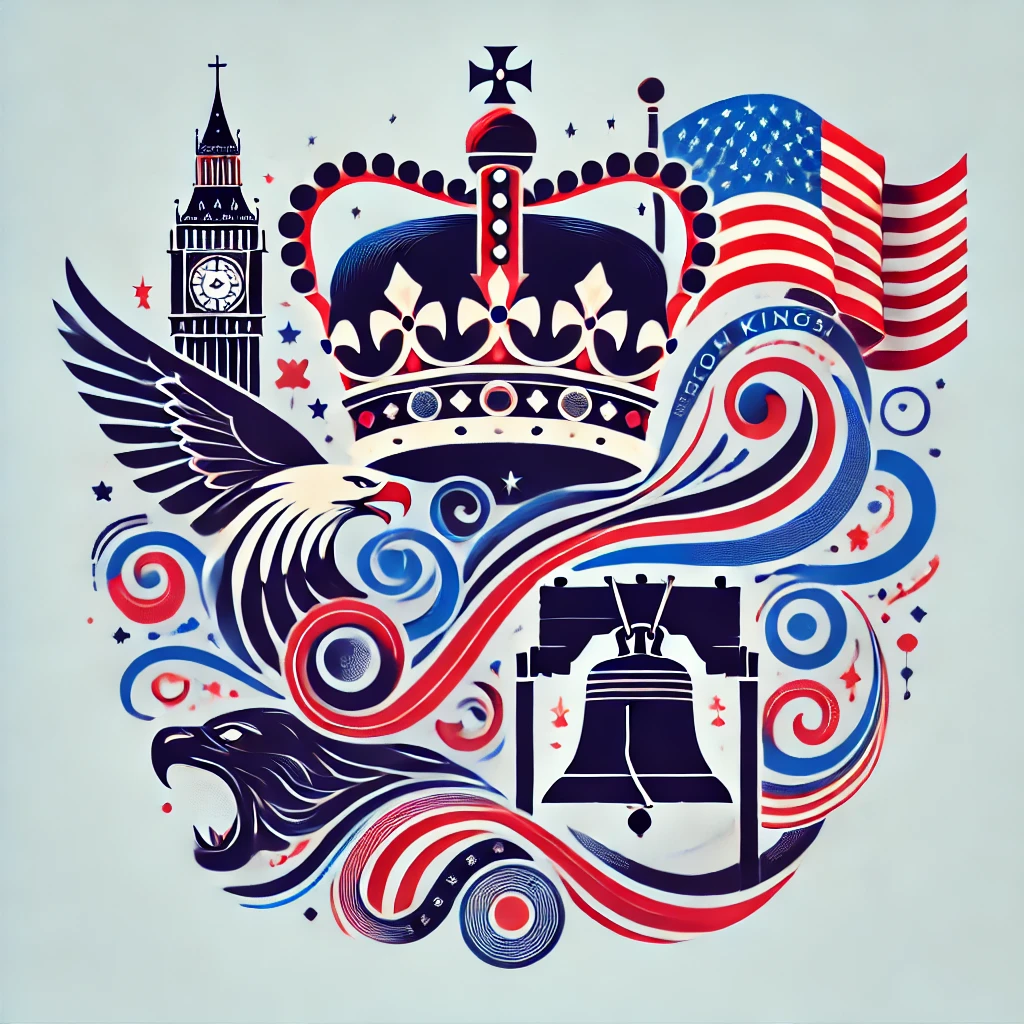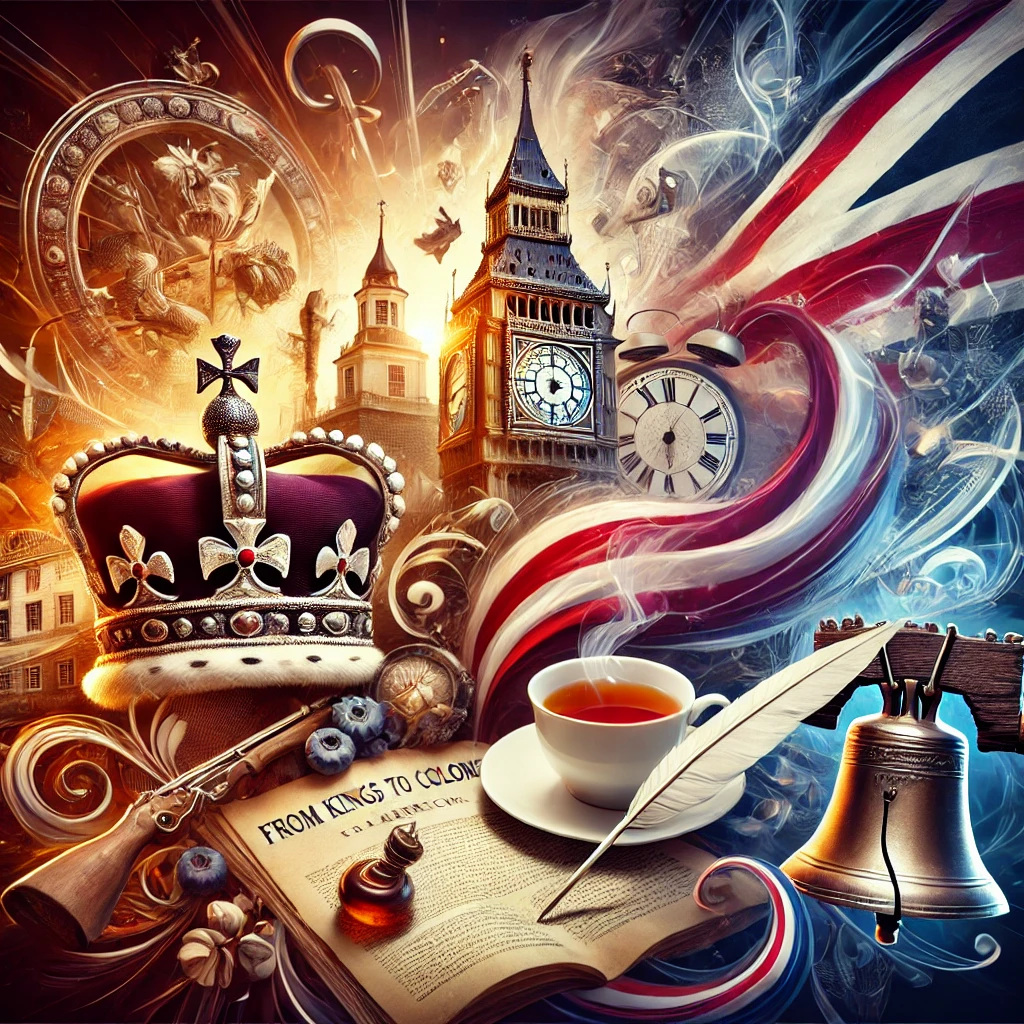Table of Contents
Introduction to the British Influence
British history plays a pivotal role in shaping American society, governance, and cultural identity. From the establishment of monarchies to significant political developments, the impact of Britain on the New World is undeniably profound. This blog post delves into the key themes and events that reflect the deep-seated British influence on America, tracing the roots of its foundational element, how kings across the sea had an huge influence in shaping the history of America.
The British monarchy, with its structured hierarchy and distinct governance style, served as an initial model for the emerging American political system. The Magna Carta of 1215, for instance, introduced the concept of limited government and rule of law, which became cornerstones of American governmental philosophy. Moreover, the English Bill of Rights in 1689 laid crucial groundwork for the development of democratic principles that would later be echoed in the U.S. Constitution.

Colonial America, heavily populated by British settlers, inherited numerous societal customs, cultural norms, and legal systems from the motherland. The common law system, educational frameworks, and even language have their roots deeply embedded in British tradition. These elements collectively contributed to shaping the American cultural landscape, fostering a sense of continuity even as new distinct identities began to form.
Key historical milestones such as the early charters granted to companies like the Virginia Company, the establishment of the thirteen colonies, and the eventual drive for independence will be explored in this post to underscore the British imprint on American history. Understanding these influences not only sheds light on the shared history between the two nations but also highlights the transformative journey from British colonies to an independent United States.
This exploration reveals the nuanced interplay of British history in the formation of American cultural and political infrastructure, providing a comprehensive overview of how past events and ideologies have laid the groundwork for the contemporary American landscape.
The Era of British Monarchy and its Governance
The era of British monarchy charted a profound course in history, laden with impactful governance and policies that laid the cornerstone for political systems in the American colonies. A succession of monarchs, each with their distinctive reign, left indelible marks on governance and law, contributing significantly to the political thought that would transcend the Atlantic.
Central to this era was the concept of a centralized monarchy, crystallized during the reigns of influential monarchs such as Henry VIII and Elizabeth I. Henry VIII notably broke from the Catholic Church, establishing the Church of England and reinforcing the notion of sovereign supremacy. This act of reformation was not just a religious pivot but a statement of authoritarian rule—a precedent that highlighted the monarch’s unchecked control over religious and political realms.
Elizabeth I further augmented the prominence of the monarchy with her deft handling of both domestic and foreign affairs. Her reign epitomized stability and prosperity, underpinned by a blend of diplomacy and rigid governance. Through her policies, Elizabeth I navigated the complex web of European politics while fortifying England’s national identity and administrative apparatus, which included an evolving parliamentary system.
The subsequent Stuart era, marked by the reigns of James I and Charles I, introduced more complex dimensions to British governance. James I’s belief in the divine right of kings increasingly clashed with the emerging parliamentary discourse of shared governance. His son, Charles I, faced conflicts that escalated into the English Civil War, profoundly questioning the extent of monarchical power. These turbulent times culminated in the historic trial and execution of Charles I, and the brief establishment of the Commonwealth under Oliver Cromwell.
Though short-lived, the Commonwealth period briefly shifted the governance paradigm, emphasizing republican ideals. However, the monarchy was restored with Charles II, albeit with new limitations that gradually shaped a constitutional monarchy. These developments were pivotal, as they ingrained elements of representative governance and legal oversight into British political thought.
Thus, the legacy of British monarchs and their governance formed the bedrock of political ideologies that traveled to the American colonies. Their influence permeated through policies, institutional frameworks, and ideologies that underscored the colonies’ quest for self-governance and the eventual birth of a new nation. The fusion of these historical tenets fostered an environment where the balance of power, legal structuring, and representative governance could evolve and take root across the Atlantic in the burgeoning American territories.
Colonial Expansion and Early Settlements
British history provides a compelling backdrop for understanding the colonial expansion that deeply influenced early American settlements. The motivations behind Britain’s expansive agenda were multifaceted, encompassing economic prospects, religious freedom, and geopolitical strategy.
At the heart of British colonial expansion were economic incentives. With the advent of mercantilism in the 16th century, Britain sought to establish colonies that could furnish raw materials and serve as markets for British goods. These economic ambitions catalyzed the founding of the Jamestown settlement in 1607, the first permanent English colony in America. Jamestown represented the embodiment of economic aspirations, becoming a profitable venture primarily through the cultivation of tobacco.
Religious motivations also played a crucial role in the establishment of early colonies. Discontent with the Anglican Church drove groups of Puritans and other religious dissenters to seek a new beginning in America. This quest for religious freedom culminated in the establishment of the Plymouth Colony in 1620 by the Pilgrims. Their establishment was characterized by a communal ethic and the Mayflower Compact, a pioneering form of self-governance rooted in religious principles.
The geopolitical landscape further fueled British colonization efforts. Envious of the territorial gains made by European rivals like Spain and France, Britain was determined to expand its own influence. The colonies functioned as strategic buffers and bases of operation in the New World. British history, with its complex interplay of power and empire, thus directly influenced the creation of settlements like Jamestown and Plymouth.
Integral to the formation and growth of these early settlements were British practices and policies. Governance structures, legal systems, and economic models from Britain were transplanted into the American colonies, laying a foundation that would significantly impact the future United States. British history’s legacy of legal traditions, economic policies, and religious influences thus profoundly shaped the trajectory of early American development.
The Transatlantic Trade and Economic Policies
The influence of British history on American development is vividly illustrated through the transatlantic trade and economic policies that were imposed on the American colonies. The system of mercantilism, which prioritized the accumulation of wealth through a favorable balance of trade, was a defining economic policy of the British Crown. British authorities envisioned the colonies as both suppliers of raw materials and consumers of British manufactured goods, thus ensuring that economic benefits flowed back to the mother country.
A central feature of this mercantile system was the enactment of the Navigation Acts, beginning in the mid-17th century. The Navigation Acts were a series of laws that restricted foreign ships from trading with the colonies, mandating that certain valuable colonial commodities—such as tobacco, sugar, and later, rice and indigo—could only be exported to England or other English colonies. This legislation was designed to guarantee that the American markets leaned heavily on British trade and commerce, ensuring a reliance that would fundamentally shape colonial economic life.
The transatlantic trade, at its core, was a triangular system involving Europe, Africa, and the Americas. European goods were exchanged in Africa for slaves, who were then shipped under brutal conditions to the Americas, where they were sold to work on plantations. The raw materials produced on these plantations were then sent back to Europe, completing the trade triangle. This system not only bolstered the British economy but also made the American colonies integral components of an expansive British trade network.
Moreover, the stringent economic policies and restrictions imposed by the British crown bred significant discontent among the colonial populace. Colonists increasingly resented their economic subservience and the monopolistic control exerted by British merchants and policymakers. Such grievances gradually fomented a spirit of rebellion, as economic frustrations melded with political and social aspirations for greater autonomy and self-governance.
Thus, the transatlantic trade and British economic policies were pivotal in shaping the early American economy and sowing the seeds of eventual revolution. By binding the colonies in an intricate web of commerce and regulation, these policies influenced both the economic development and the burgeoning desire for independence among the American colonies.
Cultural and Social Influence in the Colonies
British history significantly shaped the cultural and social landscape of early America. The settlers brought with them multifaceted aspects of their heritage, which played a crucial role in molding the nascent society. The most noticeable contributions were in language, religion, education, and social norms.
The linguistic influence is perhaps one of the most enduring legacies that British settlers left. English became the dominant language in the colonies, imbuing the American dialect with British mannerisms, vocabulary, and expressions. This linguistic foundation established a basis for effective communication and legal proceedings, critically aligning American social and political systems with English customs.
Religion also held a paramount position in the lives of British settlers. The Anglican Church, alongside various Protestant denominations like Puritans and Quakers, fortified the spiritual fabric of the colonies. Many settlers sought religious freedom, and as such, religious pluralism began to flourish. This religious diversity and the resulting ethos of tolerance became intrinsic to the American social landscape and laid the groundwork for the First Amendment rights.
In the realm of education, British influence was notably significant. The settlers established educational institutions modeled after those in Britain. They prioritized literacy and learning, founding the first American colleges and universities, such as Harvard in 1636 and William & Mary in 1693. These institutions became bastions of advanced learning and social mobility, shaping American intellectual life.
Social norms and customs from British history permeated daily life in the colonies. British laws, customs, and societal structures served as prototypes for colonial governance and social hierarchies. The Magna Carta, for instance, provided a foundational document that influenced the development of American legal principles. Social conventions around property rights, class distinctions, and community organization were woven into the fabric of colonial society.
The cultural and social influence of British settlers in America is undeniable. Through language, religion, education, and social norms, the settlers implanted elements of their heritage that evolved and became integral to the burgeoning American identity. These aspects of British history not only shaped colonial society but also left a lasting imprint on the development of the United States.
Legal and Political Foundations
British history has played an undeniable role in shaping the legal and political foundations of America. Essential British documents such as the Magna Carta, the English Bill of Rights, and common law principles laid down a framework that would significantly influence American governance. These British legal traditions were deeply embedded in the colonial charters and the legislative assemblies formed in America, serving as the backbone for the emerging nation’s legal and political systems.
The Magna Carta of 1215 is often heralded as a cornerstone document in British history. It established the principle that no one, not even the king, is above the law. This early assertion of individual rights and limitations on governmental power resonated strongly with American colonists. They incorporated these ideas into their colonies’ governance, sowing the seeds for the rule of law and individual liberties that would become fundamental to American ideology.
The English Bill of Rights of 1689 further built upon these concepts, emphasizing parliamentary authority and the protection of individual freedoms against tyrannical rule. Key provisions, such as the right to petition the government and the prohibition of cruel and unusual punishment, found their way into the American Constitution and the Bill of Rights. This document provided a more immediate and practical template for American colonies in establishing their own legislative bodies and judicial systems.
Common law principles, which evolved over centuries of British judicial decisions, also had a profound influence on American legal thought. These unwritten laws, based on precedents and judicial interpretations, established a legal consistency that the American colonies adapted. Colonial courts often referred to British common law when making rulings, and this reliance laid the groundwork for the common law system that would become a staple of American jurisprudence.
Overall, the British legal and political traditions provided a rich tapestry from which American governance was woven. By assimilating key concepts from documents like the Magna Carta and the English Bill of Rights, and by adopting the intricacies of common law, early American leaders were able to create a robust and enduring legal framework that continues to underpin the United States’ political institutions to this day.
As the American colonies grew in economic strength and societal complexity, their relationship with Britain became increasingly strained. The British government’s attempts to exert tighter control over the colonies met with growing resistance, leading to a series of confrontations that eventually paved the way to independence. One of the key flashpoints was the introduction of the Stamp Act in 1765, which imposed a direct tax on the colonies for paper goods and legal documents. This act was perceived not only as an economic burden but also as a symbol of Britain’s disregard for the colonies’ autonomy, arousing widespread protest and coordinated opposition.
Further aggravation occurred with the infamous Boston Tea Party in 1773. The East India Company, struggling financially, was allowed by the British government to sell tea directly to the colonies, bypassing colonial merchants and undercutting their prices. In response, a group of colonists, disguised as Mohawk Indians, boarded British ships and dumped an entire shipment of tea into Boston Harbor. This act of defiance was a bold statement against British economic policies and galvanized anti-British sentiment across the colonies.
The British reaction to the Boston Tea Party came in the form of the Intolerable Acts of 1774. These punitive measures included the closure of Boston Harbor until the lost tea was paid for, the dissolution of Massachusetts’ self-government, and the quartering of British troops in colonial homes. The severity of these acts was intended to isolate Massachusetts and suppress dissent but instead unified the colonies in their opposition to British rule.
These escalating tensions precipitated the colonies’ quest for independence. The First Continental Congress convened in 1774 to coordinate a unified response to British policies, marking a significant step towards collective action. The situation ultimately reached its zenith in 1776 when the Second Continental Congress adopted the Declaration of Independence. This seminal document not only articulated the colonies’ grievances but also crystallized their aspirations for self-governance and liberty. The growing chasm between British policies and colonial ideals was thus definitively addressed, setting the stage for the American Revolution.
Legacy of British Influence in Modern America
The influence of British history on modern America is both profound and enduring, manifesting in various facets of government, legal systems, cultural practices, and societal norms. The American system of governance, for example, is deeply rooted in British political traditions. The concept of a bicameral legislature, comprising the Senate and the House of Representatives, mirrors the British Parliament’s House of Commons and House of Lords. The Wall Street financial district bears a striking resemblance to the financial institutions of London, highlighting the continuity of economic practices.
The American legal system also owes much to British jurisprudence. Common law, a critical component of both British and American legal frameworks, is based on precedent and judicial decisions rather than codified statutes alone. This system promotes consistency and stability, attributes highly valued in both societies. The principle of Habeas Corpus, ensuring fairness in the detention of individuals, was inherited directly from British legal traditions.
Culturally, British traditions have found a lasting place in American society. Literary works from British authors such as Shakespeare, Austen, and Dickens are studied extensively in American educational institutions, underscoring the cultural continuity between the two nations. Even American English reflects its British origins, albeit with some evolutions over time. Celebratory practices like Thanksgiving, although uniquely American in context, also find roots in British harvest festivals.
Furthermore, societal norms in America heavily reflect British ceremonial and etiquette traditions. Though transformed by the unique context of American history, the British emphasis on manners, respect for rule of law, and civic responsibility are evident in how American society functions today. Institutions like the Smithsonian and the public library system, inspired partly by British models, continue to influence cultural developments in the United States.
Ultimately, the legacy of British influence in modern America represents a complex tapestry of continuity and transformation. It is through this intimate historical relationship that both similarities and distinctive American developments can be best understood.






